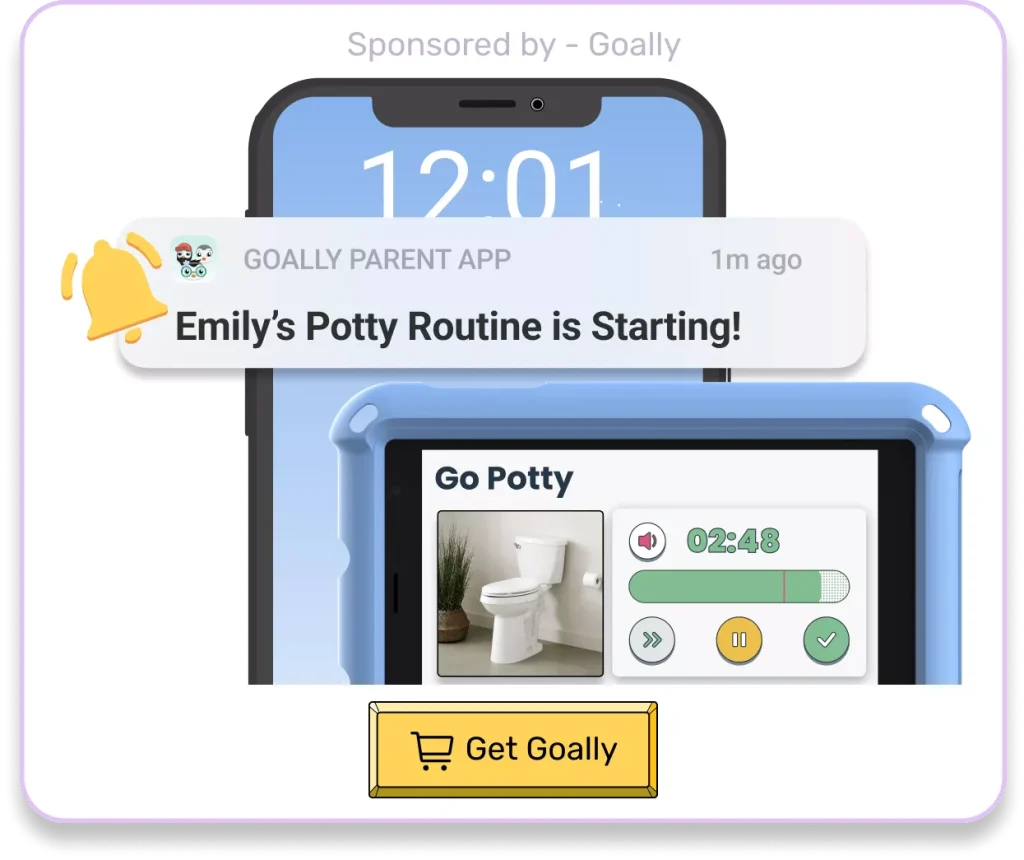About 1 in 44 children has been identified with Autism Spectrum Disorder according to estimates from the CDC. Autism Spectrum Disorder, often referred to as ASD, is a developmental disorder that affects communication, social interaction, and behavior. Additionally, ASD is a spectrum disorder because it affects individuals differently, its severity can range from mild to severe. So, how is autism diagnosed? Usually an autism diagnosis is done in early childhood and can continue throughout a person’s life.
Table of Contents
Who Diagnoses Autism?
An accurate autism diagnosis involves a team of professionals. The team may include a pediatrician, developmental pediatrician, psychologist, speech-language pathologist, and occupational therapist.
Goally | Visual Scheduler for Autism
Does your child struggle with getting ready in the morning independently? Goally’s routine app on the best tablet for kids breaks down large tasks into small, achievable steps for autistic kids. Create custom routines with your own videos & pictures for every step.
Pediatricians and primary care physicians play a vital role in the early identification of autism. They are often the first healthcare providers to see a child and may notice early signs of ASD during routine check-ups. Pediatricians can refer children for further evaluation by specialists if they suspect ASD. Referral to specialists is important because they have expertise in the diagnosis and treatment of ASD. They can perform comprehensive evaluations to determine if a child has ASD and can develop a treatment plan tailored to the child’s needs.
The Diagnostic and Statistical Manual of Mental Disorders (DSM-5) is the standard reference used to diagnose ASD. It outlines the criteria for diagnosis based on two categories: social communication and restricted and repetitive behaviors.

How Early Can Autism be Diagnosed?
Some early signs of autism may include delayed language development, difficulty with social interaction, lack of interest in playing with others, and repetitive behaviors.
There are several screening tools available to determine if children may be at risk for ASD. Screening tools such as the Modified Checklist for Autism in Toddlers (M-CHAT) and the Social Communication Questionnaire (SCQ) help identify children at risk for ASD. These tools are easily administered and parents, caregivers, or healthcare providers can do them.
Early diagnosis of ASD can lead to early intervention and treatment, which can improve a child’s developmental outcomes. Additionally, it can also help families access resources and support, which can make a significant difference in their child’s development.
Steps in an Autism Evaluation
So, how is autism diagnosed? Medical professionals perform a comprehensive evaluation to rule out any medical conditions that may be contributing to a child’s symptoms. This may include a physical exam, hearing and vision screenings, and genetic testing.
How Is Autism Diagnosed?
Developmental and behavioral screening is performed to assess a child’s developmental milestones and behaviors. This may include assessments of language development, social interaction, and play skills.
Medical professionals perform diagnostic assessments to determine if a child meets the criteria for an ASD diagnosis. These assessments may include psychological evaluations, speech and language assessments, and occupational therapy assessments.
After the assessments are complete, the team of professionals will meet with the family to discuss the results and determine if the child meets the criteria for an ASD diagnosis. If a child receives a diagnosis, the team will work with the family to tailor a treatment plan to the child’s needs.
Tips to Help Parents Prepare for an Autism Diagnosis
Educate Yourself About Autism
Parents can educate themselves about autism by reading books, attending workshops, and talking to other parents of children with autism. It’s important to understand what autism is and how it may affect their child’s development.
Keep a Journal of Your Child’s Behaviors
Keeping a journal of a child’s behaviors can help parents provide professionals with important information during the evaluation process. This journal can include descriptions of behaviors, including when they occur and how often.
Prepare for Emotional Reactions
Receiving an autism diagnosis for a child can be an emotional experience for parents. It’s important for parents to prepare for their emotional reactions and seek support if needed.
Seek Support
Parents should seek support from family, friends, and professionals throughout the evaluation process. Support groups and counseling can also be helpful for parents of children with autism.

Read more: Does My Kid Have Autism?
Tips to Help Calm Kids Taking Autism Evaluation
Explain the Process in Age-appropriate Language
Explain how a person receives an autism diagnosis in age-appropriate language. This can help alleviate any fears or anxiety the child may have.
Use Visual Aids and Social Stories
Visual aids and social stories can help children understand what to expect during the evaluation process. These tools can help children feel more comfortable and less anxious.
Practice Relaxation Techniques
Parents can teach their child relaxation techniques, such as deep breathing or progressive muscle relaxation, to help them feel calm and relaxed during the evaluation process.
Bring Comfort Items
Parents can bring comfort items, such as a favorite toy or blanket, to help their child feel more comfortable and relaxed during the evaluation.
Receiving an autism diagnosis can be overwhelming, every child with autism is unique and may require different treatment and support. However, a diagnosis of ASD does not define a child or their future. With early intervention, support, and resources, children with autism can lead fulfilling and productive lives. It’s vital for parents to educate themselves about autism, seek support, and advocate for their child’s needs.
This post was originally published on 03/27/2023. It was updated on 06/27/2023.

Goally
We help parents teach their kids life skills, like doing bedtime and morning independently. Backed by science, we incorporate evidence-based practices and expert-informed designs in all of our apps and content.







